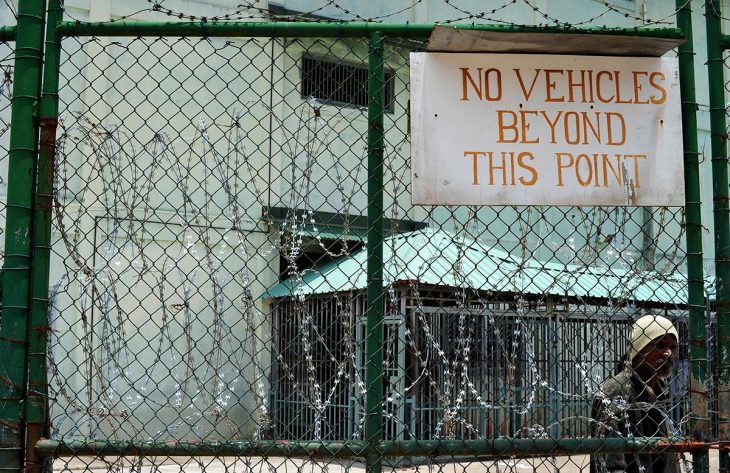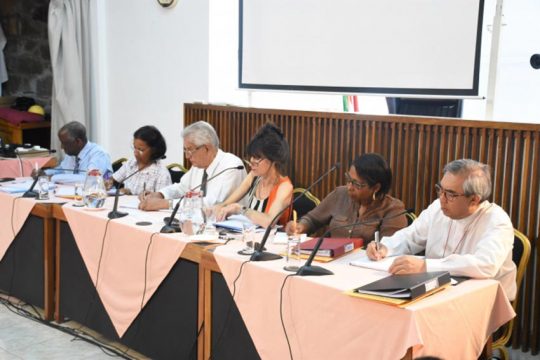Since it has started its public sessions in September 2019, the Truth, Reconciliation and National Unity Commission (TRNUC) in Seychelles has had the task of determining the validity of some of the complaints presented to them in relation to the 1977 coup d’état and various human rights violations under the 1977-1992 one-party system. So far the TRNUC has managed to plough through the 499 complaints that have been submitted to it before the deadline of 9 February 2020. It has determined that 379 were prima facie admissible and 40 inadmissible. 34 cases have been retracted by complainants while 46 cases are awaiting admissibility determinations due to the complainants having failed to provide sufficient information for that determination to be made.
The number of cases may seem insignificant when compared to the caseload of other such commissions, but the Seychelles’ population stands at less than a 100,000 people today, and was only 60,000 in 1977 when France-Albert René took power through a coup and imposed a one-party system.
Last April, the TRNUC resumed its public hearings after halting them for three months because of the Covid-19 pandemic. Last year it already had to take a three- month break as a result of health restrictions imposed on most of the institutions in the small island state to help contain the spread of the coronavirus. These delays are hampering the efforts of the Commission to complete its work within its three-year mandate. But another uncertainty relates to how the complainants will be paid compensations for the wrongs they have suffered.
Locked-up for anti-government propaganda
On May 21, Joseph Leon was called as a witness in the Andre Barallon case, where arrests were made in 1985 for the publication and distribution of anti-government leaflets. Leon has been living in exile in the United Kingdom since his hasty exit from the country in the mid-1980s. Back then, like Barallon, he had been one of the men involved in the distribution of the said leaflets. He explained that when they saw a police and army roadblock from a distance they hurriedly dumped all the incriminating publication. When the officers searched their vehicles, they found nothing. “What I know is that the papers that we threw around in the Anse Aux Pins area had pictures of Albert Rene with his bottom half being drawn as a mermaid and they were against the government, but I later found out that an officer had seen us dump the evidence,” he said.
Leon testified that although law enforcement officers did not catch them with the leaflets, all six men involved were then arrested and locked up at the army camps at Pointe Larue - later transferred to the prison facilities on Ile Longue. “Ile Longue was hard, we were given food that sometimes had slugs in them in addition to our privileges to going out in the sun also being taken,” the witness explained via Skype. Fifteen days after his release, Leon landed at London’s Gatwick airport, dressed in summer clothes in the middle of winter.
“I am happy to be giving evidence before you today, not really for compensation, but [because] I feel I should clear the air about what really happened to us back then,” Leon concluded.
“People should be made to pay!”
Leon may have shown some magnanimity. But other complainants have different expectations.
Jimmy Tirant said he had served as an army officer between 1989 to 1993, but was later victimised due to his political beliefs as a Democratic Party supporter. His tale is one of numerous detentions in cells on Mahe, the main island of the Seychelles archipelago. On May 18 Tirant told the Commission he had been tortured at the Grand Police facility - a facility that has been described as an unofficial prison where people were taken to be detained and tortured by soldiers. Tirant said he had been pulled up and down an avocado tree by his handcuff. “It was around six when they tied my feet to the avocado tree. Mirabeau took a hose and hit me hard, three times under my feet. They beat me as from 6pm to 6.45pm. I was there from Saturday and I was released on Monday. At Grand Police, if someone was being beaten, it’s almost like ants and sugar, the person is not visible but the army is on them like ants,” Tirant testified. “I am happy that the Seychellois people are finally seeing the previous regime for what it really was, and I believe these people should be made to pay! They cannot go around thinking that they can do what they want to people and get away with it,” Tirant concluded.
McIntyre calls for a government trust fund for victims
It was not clear on how Tirant wanted to be compensated, but “it is clear to the Commission that most of its complainants want reparations for the human rights violations they suffered,” explained the TRNUC chairperson, Australian international lawyer Gabrielle McIntyre in a written statement to Justice Info. “It is not the role of the Commission to do any more than make recommendations to the government on reparations, which it considers should be awarded in its final report. In that respect, it is not the mandate of the Commission to ensure that reparations can be awarded to complainants. That is the responsibility of the government of Seychelles should it agree to implement any or all of the recommendations made by the Commission,” she continued.
“The Commission nonetheless believes that the implementation of the Commission’s recommendations on reparations to victims is an important part of the reconciliation process. This is even the more so in a context where the Commission is mandated to grant amnesty to perpetrators following a full and frank disclosure of their involvement in human rights violations and a sincere apology to victims. The Commission anticipates commencing the first of its Amnesty proceedings by July 2021. Given the fact that the Commission is likely to grant amnesty in the near future, it would like to see the government make some commitment now through the
establishment of a trust fund and the adoption of measures to generate income for that fund so that victims will be assured that reparations will be made,” said MacIntyre.






